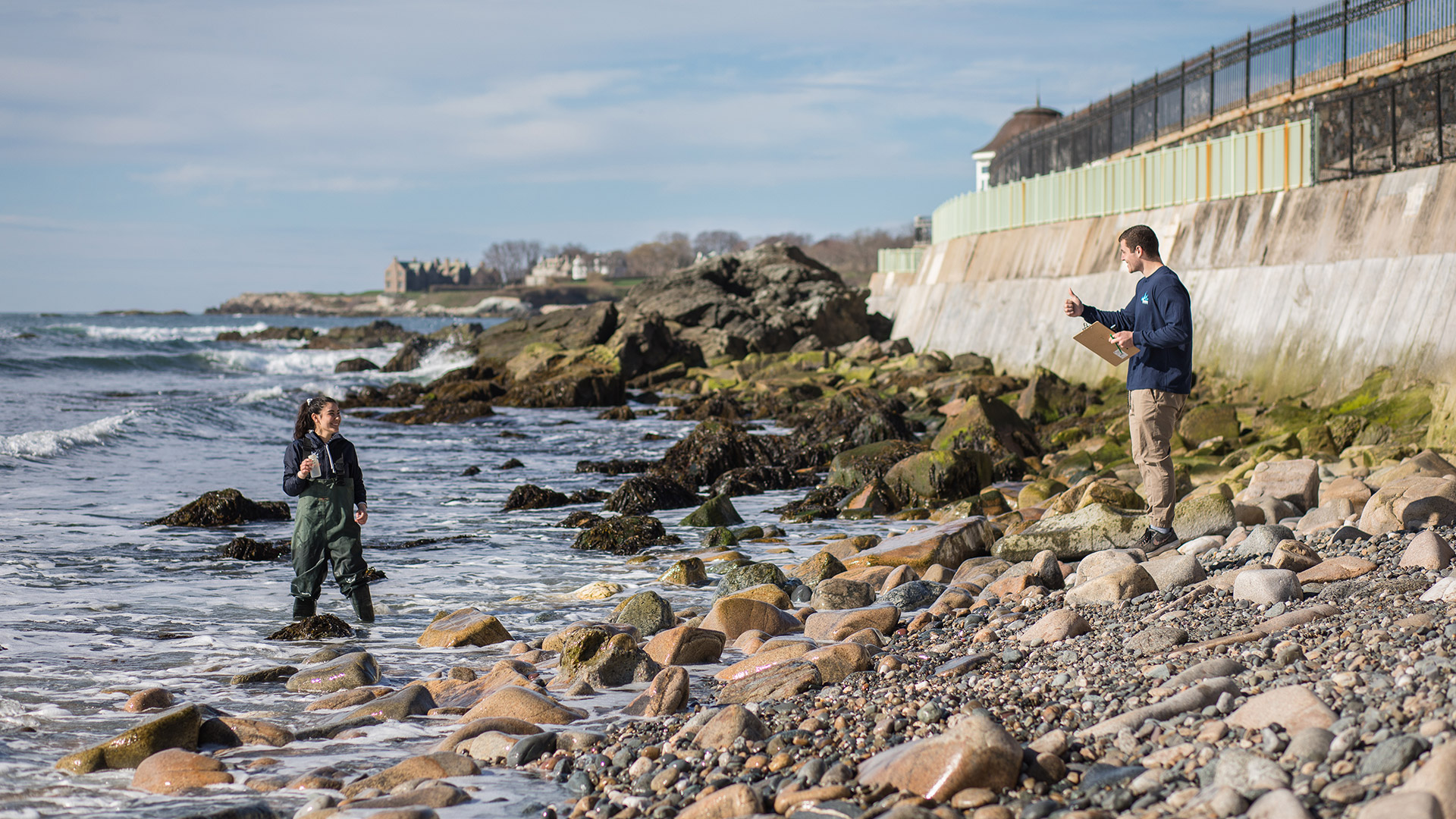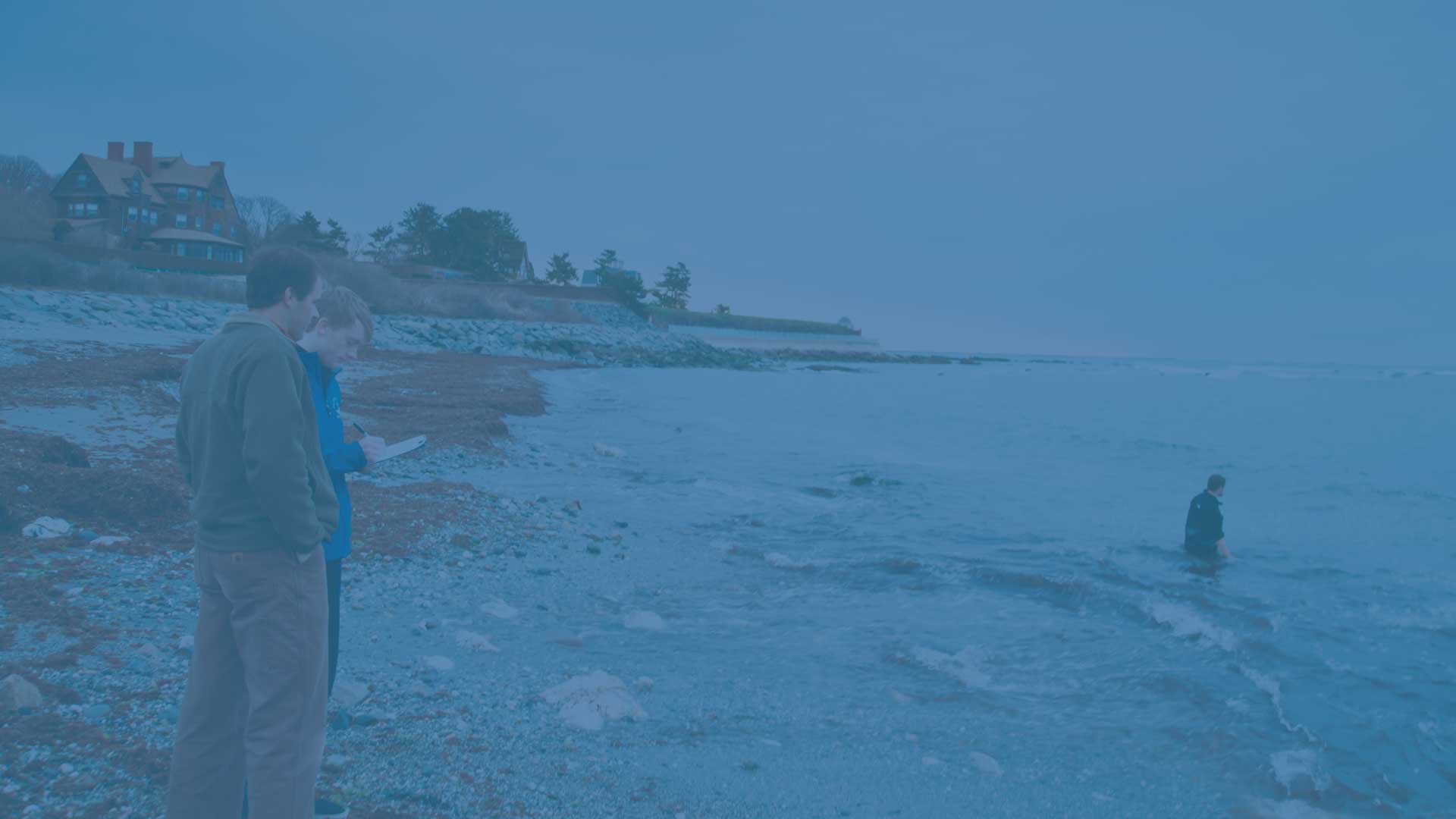
Environmental Studies
Salve Regina University's bachelor's degree in environmental studies grows from our stated mission to act as stewards of the earth. It is the unique outcome of the talents of our faculty; our distinctive surroundings; our geographic proximity to freshwater and saltwater bodies, forests and farmland; and collaborations with local and regional groups such as the Environmental Protection Agency, the Rhode Island Department of Environmental Management and the Aquidneck Land Trust.
Address Real-World Environmental Issues
Salve Regina's environmental studies program exposes students to the broad range of issues that arise from the interaction of humans with the natural world, and to the tools required to understand and solve environmental problems.
Coursework is drawn from fields such as biology, math, public policy, economics and cultural and historic preservation. Student-directed research leads to a thesis in the senior year, and majors are encouraged to address real-world problems through internships and field study.
Program Spotlight: Living Laboratory
Newport is a living laboratory – it gives students in a number of different disciplines the opportunity to effectively apply what they’re learning in the classroom to the field. Our program leverages that aspect of being in the Newport community.
There is always a strong aspect of social justice, and in particular environmental justice, so those aspects of social justice are embedded within our program very concretely. Because of our connections with our community partners, our students get to act on these aspects of social justice and environmental justice right here in the Newport community.
Dr. Jameson Chace, professor and chair, Department of Cultural, Environmental and Global Studies

Our Faculty
In addition to teaching, we conduct research designed to enable undergraduates to gain hands-on experiences in field ecology and environmental sciences. Our work has been recognized with numerous awards from national and regional environmental organizations, and we are routinely invited to present peer-reviewed papers at major conferences around the globe.
Life After Salve Regina
Our graduates are uniquely prepared to work professionally on environmental issues found in every kind of workplace. As awareness of these issues grows, our graduates offer a strong combination of science and policy knowledge that make them an invaluable resource to organizations in a broad range of environments, including:
- Federal, state and local government: Working as environmental planners, analysts and policymakers.
- Corporations: Managing their compliance with environmental regulations and conducting audits of internal environmental efficiency.
- Nonprofit organizations: Managing or protecting natural resources, spearheading fundraising and development, and supporting the organization’s mission through public relations.
My Salve education provided me with a well-rounded knowledge base, and the major in environmental studies opened up a wide range of career opportunities. I am eligible for jobs that require a science degree, but I am also eligible for jobs that are more humanities-based. This gave me a great deal of flexibility when choosing a career path.
Abigail Burke ’19, environmental stewardship scientist, U.S. Army Corps of Engineers
Program Spotlight: The Science Behind the Job

For someone with a passion for the environment, Rebecca Longvall Bucciaglia '15 says, there's nothing like living and working on a campus by the ocean. "Salve's location is incredible," she says. "It's like having a laboratory right outside your back door."
A conservation agent for the town of Bolton, Massachusetts, Bucciaglia works on wetland permitting and helps manage 2,000 acres of open space. She credits her experiences in the environmental studies program for teaching her the science behind the job – collecting data and monitoring trends – and so much more. "I loved everything about the program," Bucciaglia says. "I was really busy as a student-athlete, but the faculty took the time to keep me on track."
As a student and a leader in the Environmental Club, she learned how to communicate with different groups and understand their goals. "I work with the public every day, and every day I use something I learned at Salve," she says.
Major in Environmental Studies (B.A.)
17 courses | 46-49 credits
Required courses:
- BIO140: Humans and Their Environment
- BIO140L: Humans and Their Environment Laboratory
- BIO255: Conservation Biology
- CEG222: Research Methods
- CEG390: Current Issues
- CEG450: Capstone
- CHP310: Introduction to Geographic Information Systems
- ECN101: Introductory Macroeconomics
- ENV334: Environmental Justice
- GLO350: Earth 2050
- POL345: International Environment and Development
Students choose one of the following:
- GLO100: Introduction to Global Studies
- SOA110: The Sociological Imagination
- SOA130: Anthropology: Interpreting Cultural Differences
Students choose two of the following:
- BIO260: Marine Biology
- BIO275: Tropical Biology
- BIO310: Ecology
- SCI104: Earth Science
- STA173: Statistical Methods
Students choose two of the following:
- CHP260: The City as a Work of Art
- ENV340: Coastal Economics and the Maritime Environment
- ENV350: Natural Resource Management
- ENV399: Special Topics in Environmental Studies
- PHL280: Environmental Ethics
- RTS332: Care for Creation: Christianity, Ethics and the Environment
Students choose one of the following:
- BIO390: Environmental Science Internship
- CEG451: Cultural, Environmental and Global Studies Thesis
- ENV360: Hydroponics Practicum
- ENV397: Environmental Studies Internship
- ENV497: Undergraduate Research
Minor in Environmental Studies
6 courses | 19-21 credits
Required courses:
- BIO111: General Biology I or BIO140: Humans and Their Environment (with corresponding laboratory)
- BIO255: Conservation Biology
Students choose two of the following:
- BIO200: Botany
- BIO260: Marine Biology
- BIO275: Tropical Biology
- BIO310: Ecology
- CHP310: Introduction to Geographic Information Systems
- ENV360: Hydroponics Practicum
- SCI104: Earth Science
Students choose two of the following:
- ENV334: Environmental Justice
- ENV340: Coastal Economics and the Maritime Environment
- ENV350: Natural Resource Management
- ENV399: Special Topics in Environmental Studies
- PHL280: Environmental Ethics
- POL345: International Environment and Development
- RTS332: Care for Creation: Christianity, Ethics and the Environment